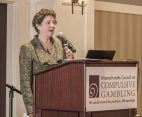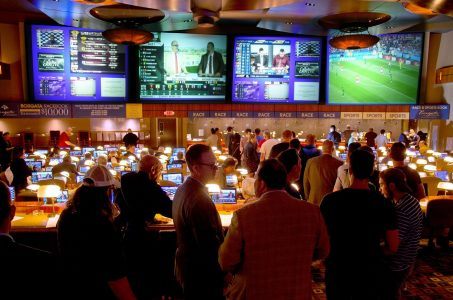Massachusetts Continues to Study Problem Gambling, Other Effects from New Casinos
Posted on: February 13, 2020, 02:41h.
Last updated on: February 13, 2020, 09:56h.
Impact from Massachusetts gaming operations on the state’s economy and social conditions continues to be scrutinized by University of Massachusetts’ researchers, as state officials project lower receipts from the casinos.

Some $3 million was recently announced for current and upcoming UMass studies on Plainridge Park Casino, MGM Springfield, and Encore Boston Harbor. Early research is focusing on Plainridge Park in Plainville.
Early on, it appeared there were no increases in problem gambling from the new slots parlor. More recently, Plainridge is getting more revenue, but the total number of players has declined. This suggests there could be a risk of problem gambling, WAMC reported, based on UMass findings, as active players appear to be spending more on the slots.
The Rev. Richard McGowan, a professor of finance at Boston College, who closely follows New England gambling trends, said he would like the UMass study to examine whether there has been “any statistically significant increase in gambling addiction” with the casinos opening in Massachusetts. Researchers should also identify which segments of the population are impacted, he said.
Given the number of college students, especially in the Boston area, what advice would they give colleges about dealing with online sports gambling,” McGowan told Casino.org on what can be studied. “[And] what would be the effects of legalizing sports gambling.”
McGowan added he would like to see policy recommendations if there are additional gambling problems. UMass confirmed the researchers will likely come up with recommendations for policy makers.
The Massachusetts Gaming Commission is treating the study as an important tool to develop statewide policies. “We look forward to continuing this groundbreaking initiative and utilizing its findings to inform policy and develop evidence-based programming,” Elaine Driscoll, a spokeswoman for the Gaming Commission, told Casino.org.
The UMass research funds come as Massachusetts Gov. Charlie Baker’s fiscal 2021 budget forecasts $282.7 million in receipts from the state’s three casinos, down from the $294 million the Commonwealth is expecting to haul in for the current fiscal year. As of the end of 2019, Plainridge Park, MGM Springfield, and Encore Boston Harbor delivered a combined $525 million in taxes and total assessments since each opened, according to the Gaming Commission.
Crime Levels at Encore Boston Harbor
One possible concern since Encore Boston Harbor opened last June is the amount of crime taking place at the Everett casino. Between June and November, over 160 people visiting the casino reportedly were arrested or given a summons, WCVB reported last year. Disorderly conduct, assault and battery, larceny, and cheating are among the most common charges at Encore.
But so far, officials said that such activity at Massachusetts casinos is comparable to other non-gambling facilities of similar size and number of visitors, Driscoll said in November.
When asked about the ongoing studies, Rachel Volberg, a professor at UMass’ School of Public Health & Health Sciences, told Casino.org, their purpose “is to monitor the social and economic impacts of casinos in Massachusetts — and assist the Gaming Commission in maximizing the benefits and minimizing the harms associated with this new form of economic development ….”
The study may focus on social concerns, such as problem gambling, public attitudes toward gambling, health and leisure, environmental impact, and crime, she explained. It will also look at economic impact, such as spending and revenues from casinos, the business environment, employment levels and income, real estate and housing, as well as government spending and revenues.
Multi-Year University of Massachusetts Studies
The studies date back to 2013, when the Gaming Commission awarded the research project to UMass researchers. A unique characteristic of this study is researchers came up with baselines for social and economic data. They tabulated findings from the 2013-14 baseline survey of 9,578 Massachusetts residents to assess gambling behavior and problem gambling before the new casinos opened.
In 2016, researchers released a study on Plainridge Park Casino, the state’s first slots parlor. It looked at where players reside and how much they spend. Last September, UMass announced how it found that out-of-state casino gambling among Massachusetts residents decreased after Plainridge Park opened in 2015.
As far as problem gambling, between 2015 and 2016, the proportion of players who newly experienced problem gambling over an entire year was 1.2 percent. UMass researchers say that amount is like other locations.
A related study at Plainridge Park looked at the casino’s impact on employment, wages, vendor spending, and fiscal impacts from taxes. A recent update showed 99 percent of $13.3 million of preconstruction spending and 85 percent of the $115.4 million of construction spending went to Massachusetts-based businesses. Construction created or supported an average of 558 full-time equivalent jobs and $46 million of wages per year over 2014 and 2015.
Related News Articles
Most Popular
Genovese Capo Sentenced for Illegal Gambling on Long Island
NBA Referees Expose Sports Betting Abuse Following Steve Kerr Meltdown
UPDATE: Former Resorts World & MGM Grand Prez Loses Gaming License
VEGAS MYTHS RE-BUSTED: The Traveling Welcome to Las Vegas Sign
Most Commented
-
UPDATE: Whiskey Pete’s Casino Near Las Vegas Closes
— December 20, 2024 — 33 Comments -
Caesars Virginia in Danville Now Accepting Hotel Room Reservations
— November 27, 2024 — 9 Comments -
UPDATE: Former Resorts World & MGM Grand Prez Loses Gaming License
— December 19, 2024 — 8 Comments -
FTC: Casino Resort Fees Must Be Included in Upfront Hotel Rates
— December 17, 2024 — 7 Comments
















No comments yet